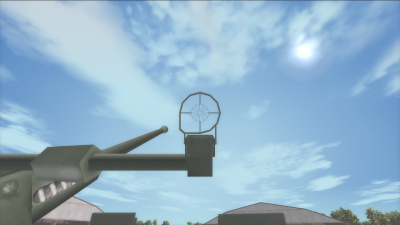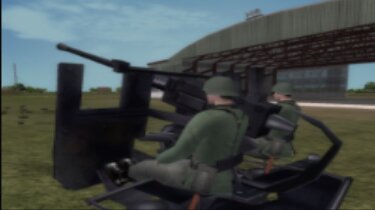Bofors 40mm
History

| |
| Main Gun Optics | |
| Specifications | |
| Designation | ? |
| Magnification | ? |
| Field of View | ? |
The Swedish-designed Bofors 40mm found wide acceptance around the world, and was one of the few weapons that would be found in both Allied and Axis service. It could keep up an impressive rate of fire without stopping for reloads.
Game Play
In Battleground Europe, the Bofors is an exceptional general purpose weapon against either ground or aerial targets. You have an ample ammunition supply, no reloader pause, and a flat trajectory making it effective with little round drop all the way out to 2km. If that enemy aircraft is even remotely within what you think is hitting range, then fire away! You’ll soon learn what is and what is not considered good range to give away your position to that enemy aircraft.
Crew 1, the commander, has 2-stage magnification for target acquisition as well as a crosshair and rangefinder. Crew two looks through the open ring sight. This sight is particularly useful against fast-moving air targets but the lack of a magnified gunner’s sight is particularly noticed when trying to engage ground targets at range, especially if they are somewhat camouflaged. When using the Bofors against aircraft, be aggressive. Slew rate for the 360 degree gun platform is very fast, you can engage close-flying aircraft even at high angle off and track the aircraft without too much difficulty. Against ground targets, you will notice that the dispersion of the rather lightweight 40mm HE shells is fairly high, and you will likely have to walk your fire across your target. 40mm HE doesn’t penetrate armor particularly well, but explosive effects will jar any target making it nearly impossible for them to successfully fire back at you.
Since it is a heavy gun, the Bofors can be manhandled but only very slowly. It’s better to get a prime mover to pull you to a location with clear fields of fire in all directions. A very good location is on the steep side of a hill, deploying just below the crest will keep you from skylining badly where your silhouette is obvious, it will reduce the arc of sky you need to cover to about 180 degrees, and, if attacked by infantry or otherwise under fire, you can simply undeploy the gun. This will cause you to start rolling downhill away from trouble. Re-deploy to stop rolling. Keep in mind that you have no gunshield, so you are particularly vulnerable to even a lone sniper.
Learn how to use the Bofors in the AA guide - AirQuake! The AA gunner's guide to an empty sky
In German Service as the Flak. 28
| Flak. 28 | |
| Specifications | |
| Type | Medium Anti-Aircraft Artillery |
| Armament | 40 mm Anti-Aircraft Gun |
| Gun Elevation | L/60: −5°/+90° (55°/s)
L/70: −20°/+80° (57°/s) |
| Turret Traverse | 360° |
| Crew | 2 (Commander, Gunner) |
| Weight | 2,800kg |
| Tow Class | Heavy |
40mm Bofors and the German 3,7cm were in the same class--the 40mm had a little longer range, but this was negated by the shell's self destruct, either by spin degradation or tracer burn out at ranges of 3000 to 7000 yards--way short of the theoretical range of 11,000 yards. The 3,7cm had a maximum range of about 7,000m and a self destruct by spin degradation at about 5000-6000m, to maximum effective ranges were similar. In point of fact, the 40mm was used by the German Navy from about 1944 on some ships. The German 3,7cm M42 had a higher rate of fire of than the Bofors, although practical rate was probably similar. To cover that undefended space between the medium and heavy flak, a somewhat larger weapon was needed, such as the planned 5,5cm Geraet 58 which was a true intermediate to handle just that weakness in AA defence.
